#so. a lot more i Would recommend than not recommend. it is a complex issue though
Explore tagged Tumblr posts
Note
what pet food brands Do you recommend?
Acana, Orijen, Diamond Naturals, Victor, Primal, Dr. Marty’s, basically any freeze dried frozen or raw food, Wellness, Fromm, Taste of the Wild, Stella and Chewy, Merrick (this one was actually recently acquired by Purina but as far as i know they never touched the formula so it’s still good), Nulo, Zignature (this one is good if your dog has a lot of allergies bc they use a lot of obscure protein sources), Natural Balance, The Honest Kitchen. there’s a lot more i Would recommend as opposed to not recommend. also a lot of pet speciality stores have their own house brand that tends to be pretty decent. the only downside is that you can Only get that food at their store.
#the thing is a lot of pet food brands are out there now that realize that people are really starting to Care abt their pets food#so. a lot more i Would recommend than not recommend. it is a complex issue though#bc some of the shittier foods are more affordable and if you can only afford that im not going to judge you#HOWEVER. the prices on science diet especially have gone up SO HIGH and it’s ridiculous bc it’s not even a good food LOL
4 notes
·
View notes
Note
Any manga you would recommend that's similar to Dungeon Meshi?
Golden Kamuy!!!
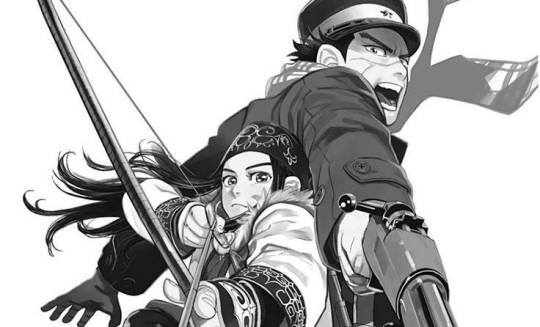
Lots of eating weird things lots of amazing characters and lots of naked men. Dungeon Meshi should learn a thing or two from it (add more naked men)
It's a much 'heavier' story than dungeon meshi tho, while its comedy too it's a historical manga that deals with more real life issues and heavier subjects so it can get pretty sad at times. The anime looks really bad tho so I'd read the manga, my favorite character is Koito cause he's cute.
I can't find a short synopsis cause it's a complex story but its basically this "immortal" war veteran and an Ainu girl traveling around the hokkaido wilderness in search of some tattooed criminals and find gold that has supposedly been hidden in the coordinates found in the tattoos 👍(it gets more complex than that as the story goes on)
Okay might not be that similar but in my defense I don't read many fantasy manga
(some panels with weird food (animal brains) under the cut)
Marcille wouldn't survive a single second with Asirpa
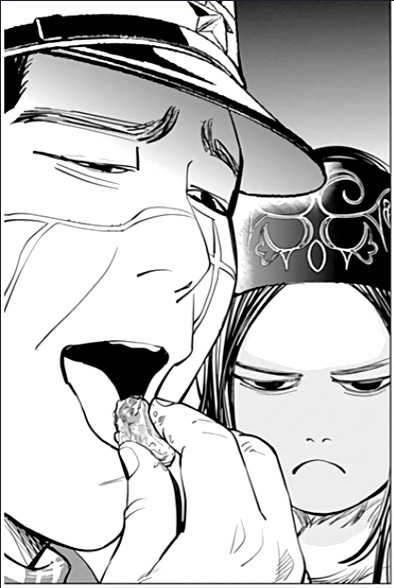
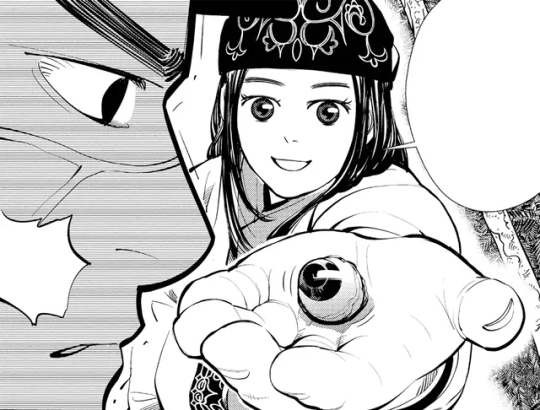
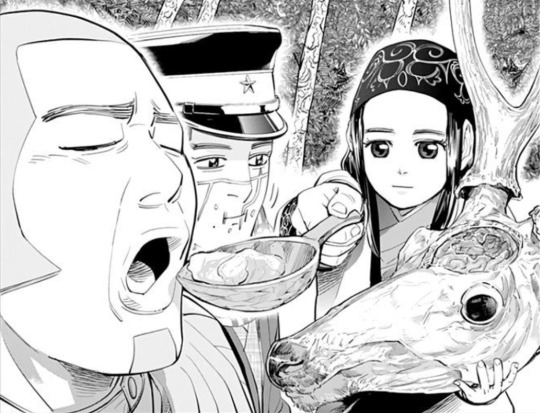
488 notes
·
View notes
Note
One of the major things I worry about with a PWM is that if I happen to pass away suddenly, then how will my next of kin be able to access all of the accounts they need to? Even if it's tedious work to write down every single password, won't my next of kin be frustrated with putting in another nonsense string of numbers and letters while they're still in the middle of grieving?
I have many weird and swirling answers to this, none of which are particularly comforting.
The dead don't owe convenience to the living. It would absolutely be frustrating to have to enter a bunch of random characters to change over an account, but it would also be frustrating to have to dig through forty pounds of paper to find which one had the passwords written on it, and it would be WAY WAY WAY worse if the account was hacked and drained because access was overly simplistic. This is actually a huge section of my Death Book because I had to do it for my dad when my mom died. (if anyone is unfamiliar with the death book see my pinned post) However: grieving was going to suck anyway, in the scheme of things complex passwords are going to be a lot less frustrating than dealing with people.
Password management and mortality is a pain in the ass. I have a section in my death book for the predeceased to write down their passwords but there's no recommendation for updating that because the unfortunate thing is that sometimes you'll write down your passwords and they'll have to change and you won't update documentation before you die. It might be better to write down recovery keys or security answers so that survivors can reset account access instead of having to deal with someone else's passwords.
There are shared password management accounts with various admin rights that allow you to have kind of a family organization - of the paid plans that I see out there, this is the best reason I've encountered for using them. You can be an admin and help reset access for your grandmother, or you can be an admin and access your brother's passwords if he dies. HOWEVER, I'm not much of a fan of these things because I don't think the security risk of having other people have access to your passwords is worth it (I'm not even sure about writing them down and putting them in a book). This is less about hacking and more about potential issues of abuse - if your elderly parent has a password manager that you and your sister administer, but your sister decides to empty the bank account, she has access to do so. If you and your partner share a password manager and they have access to your account and suddenly become overwhelmingly jealous of your relationship with a coworker, they have access to everything they need to isolate you and make your life miserable.
Everything you really need access to can use a death certificate in place of a password. Bank accounts, utility accounts, credit cards, mortgage companies, life insurance - the key to unlock all of those in the event of a death is a death certificate. Which is, in fact, a pain in the ass but it's better than the alternative (the alternative being "It's easy to access someone's account by claiming they died.") Furthermore, on many of those kinds of things the deceased shouldn't be the only one with access; my partner and I share bank accounts but we don't share a login to the bank.
Talk to your loved ones about sharing the things that are important to you (deeds, leases, account info, photos, videos, writing, etc.) and get ready to write off the rest. I don't have access to my spouse's email account, I don't want it and I never will, and any accounts tied to that address have other ways of getting access. Whatever he's doing in his email is not my business. If I were to die tomorrow Large Bastard wouldn't be able to post an update on my tumblr; he doesn't have the passwords to my devices, or the password to my password manager, or access to the email account I used to create any of my accounts.
Genuinely "what happens to my accounts when I die" is an important conversation to have with your loved ones, but the answer shouldn't be "they're able to log in to everything because my password was Fullname!Birthyear"
126 notes
·
View notes
Note
hi ! do we know whats considered easy / hard magic ? as in like what is considered beginner level magic and what is considered malleus draconia level magic
Hello hello, thank you so much for this question!
I went through the game and collected all examples of non-unique, non-artifact, non-flight-magic that I could find, and there was a lot! So much that this answer is going to be separated into four parts m(_ _)m Apologies for any inconvenience!
First are the magics that seem to be easier than others: Color-Change Magic, Fireworks, Flames, Ice, Levitation, Basic Construction, Cooking

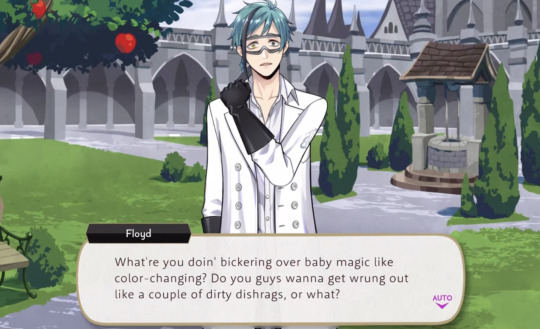

Color-Change Magic:
Sebek describes color-change magic as being extremely basic, saying that is is one of the first things that human mages learn upon entering school.
Floyd calls it a "baby magic," and Vil tells Jade a story about using it to change the color of his and his father's clothing to avoid paparazzi shortly after he enrolled at NRC and before he was able to do more complex spells.

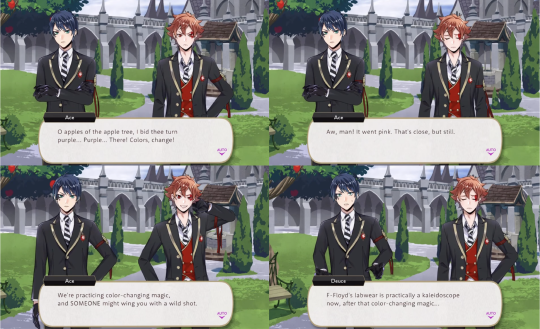
Cater asks Ace, Deuce and Grim to use color-change magic on their first day of school before they have attended a single class, apparently assuming that they would already know how to do it, but Deuce and Grim both struggle (as does Ace in a vignette).

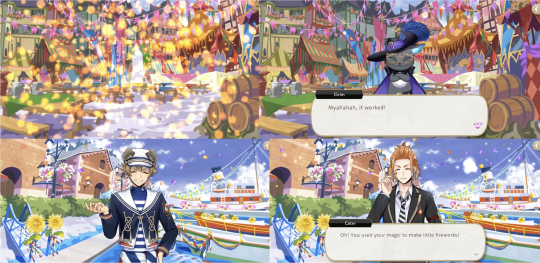
Fireworks:
Grim is capable of creating an impressive fireworks display, as are Deuce and Ruggie, and none of the three are known for being particularly adept students or mages.
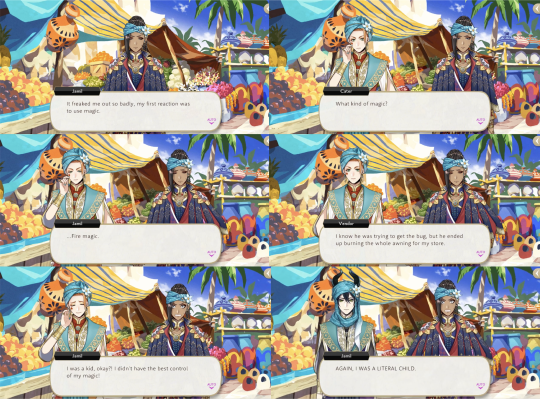
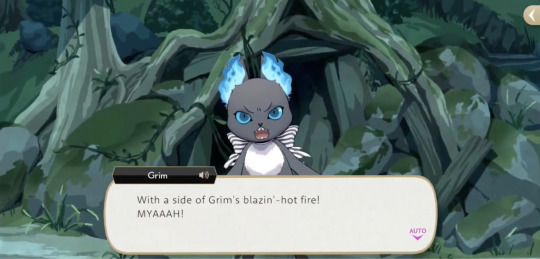
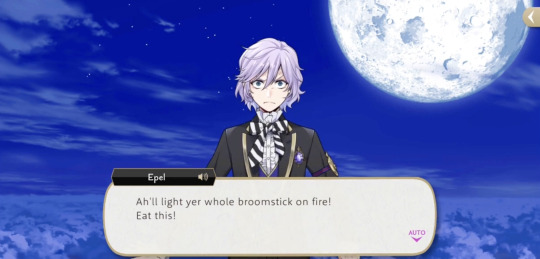
Flames:
Jamil talks about using fire magic when he was still "a literal child," and both Grim and Epel also use fire magic in the game.
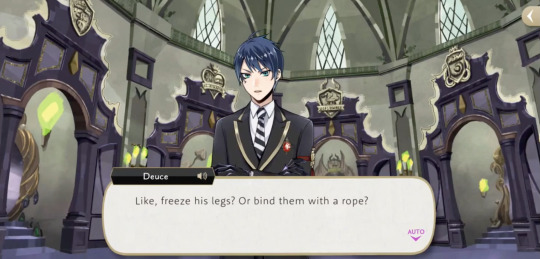
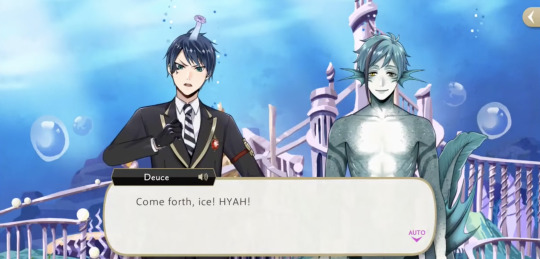
Ice:
Deuce seems capable of using ice magic, despite still being a first-year student.
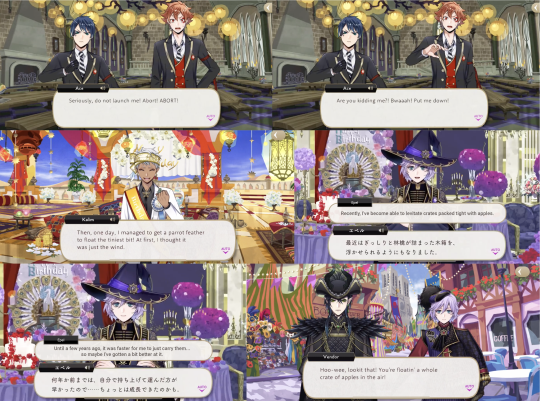
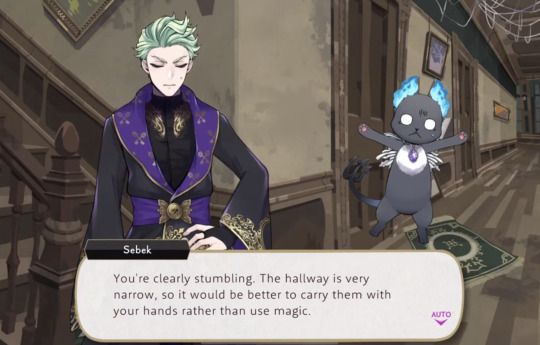
Levitation:
Deuce also seems fairly adept at levitation, and Kalim says that getting a parrot feather to float was the first magic he ever did.
Levitation might have been an early form of magic for Epel as well: he says that he was moving crates of apples with magic prior to enrolling at NRC.
Grim struggles with levitating chairs in a vignette, but this seems to be less of an issue with the magic itself and more a problem with precision (more on this later 👀).

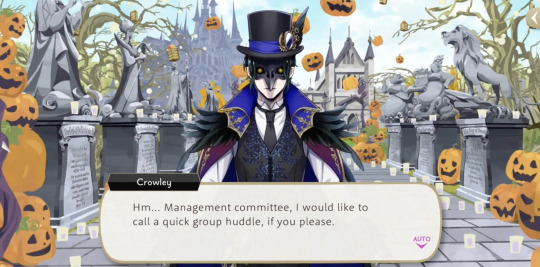
Crowley recommends that the students eject Magicam Monsters via levitation during Halloween, so he may expect that they are all capable of using it.
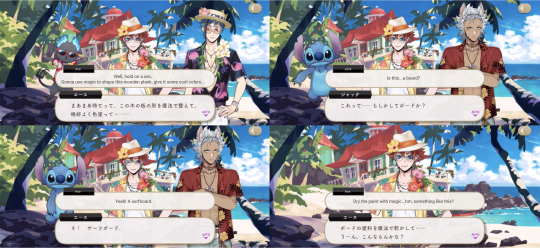
Simple Construction:
Ace creates a surfboard with ease during the Stitch event, so simple construction projects may not be too high level.


Cooking:
Not known for being one of the more talented students at the school, Kalim still seems to be able to cook with magic.
Uncertain: Summoning, Wind and Attacks

Summoning:
Deuce has been summoning cauldrons since before enrolling at NRC. Ace attempts to mimic him in Book 3 but says, "summoning magic ain't my strongest suit," so it is possible that this is just a particular strength of Deuce's rather than an overall easier magic (or maybe a particular weakness for Ace?).


Wind:
Ace has been using wind magic since the prologue, but it is a little unclear if it is a simpler magic for beginners overall or if Ace just happens to be particularly adept at it. It is possible that Jamil is the only other person we have seen use wind magic.

Attacks:
Even the magic-school-dropout in Book 5 is capable of using magic for attacks, so basic "attack magic" seems to be a fairly simple ability.
But the attacks we see in the game tend to be vague! Are the characters using things like wind, water and fire and it just isn't being specified? Or is there something else going on?
212 notes
·
View notes
Text
How to construct character psychology!

– Introduction
Hello hello! :D I’ve been very slow with my writing lately due to uni work (and some unforeseen health issues), but I’d like to still be able to make content and be interactive in the writing community, so I’m here again to share some advice based on my own experiences! One of my favourite things about writing is writing characters, specifically constructing a character’s psychology. I’d like to preface this post by saying that while I’ve had formal classes in psychology, I’m by no means any sort of expert within the field, and I also don’t believe that every aspect of how a character is written needs to be rooted in realism. However, I do want to share some insights that I got from it, and also because I feel like “character psychology” has this very mystified weight to it that makes it seem a lot bigger and intimidating than it needs to be.
So! My goal is just to share some advice on how to break down a character’s psychology and work from there! If you like what you read and would like to read more, I’ve also written a post about creating “complex” characters, which you can find the link to here! Aaand yes I think that’s about all I have to say beforehand, I hope you enjoy :,)
What do I mean when I say psychology?
Before getting into the nitty-gritty, I’d like to start with the basics, just to make sure people are on the same page when reading this post. When I’m talking about psychology here, I’m specifically referring to a character’s cognition, as in how they process information and act on it/make judgments. I’m not necessarily referring to personality in this case (although personality is an aspect of psychology, but I’m more so referring to personality as a consequence of cognition here, rather than as a collage of traits and behaviour).
Another thing I want to clarify is that exactly how much of human behaviour is nurture vs nature is a hotly debated topic that I’m completely under-qualified to take a stance on, but for the sake of this post; I believe both are equally essential aspects of human behaviour, so just keep that in mind! (I’m looking at any behaviourists in the chat rn). That being said; I’m not really comfortable treating psychology as “nature” (as such rhetorics are often used in gender-essentialist and other bigoted ways of thinking), so my main focus will be nurture, since that’s what is most readily observable!
Determining character motivation
If you’re working with very little or bare minimum characterization, my recommendation is to consider; what motivates a person to act? And by this, I’m not referring to the external quest or goal behind the character, but rather, what’s the core of what motivates your character to act at all? Even in grand, epic adventures of good vs evil, where the external goal is as simple as “putting an end to whatever evil the bad guys are doing”, there needs to be a reason a character is specifically on the side that they’re on. Multiple characters can be on the same side, but they might find themselves on that side for vastly different reasons, even when their exterior goals are the same. From there, you’ll want to consider what informs this motivation in particular.
One technique I love to employ, when still figuring out my character, is to have them make some sort of bizarre decision, a decision I’d initially think to be improbable for this particular character, and then try to list off various justifications or variables that would allow for this character to make this particular decision. There’s a couple of reasons for why I do this.
1) It removes some of the pressure to have a perfectly cohesive, perfectly put together and neatly defined character from the get-go. The drafting process isn’t just for plot and story structure’s sake, it’s also there for you to experiment with characters! Having your characters make story altering decisions that possibly challenge or contradict themselves is a great way to make sure that you’re writing active characters as opposed to more passive ones, and I think the first couple of drafts should really be a playground for you to see just how far you can stretch your characters based on their characterisation.
2) It helps me clarify what is and isn’t important in my character’s decision making. I’m a firm believer that most decisions/actions aren’t inherently in or out of character; it just depends on whether or not the readers/viewers can understand the character’s thought process behind their decision, and this ultimately comes down to how well you, as the writer, conveys the character’s priorities when they make decisions. If you’re established that a character acts based on a code of honour, an exterior source to morality and conduct, then the justifications and reasonings they would use to justify murder would likely be very different than a character who acts based on their own convictions. This is also a great way to show character development; by showing how a character’s decisions gradually change as their cognition change as they develop.
3) It allows me to explore nuance and make note of potential contradictions within the character’s way of thinking—which is often the most interesting aspects of a character’s psychology, at least in what I enjoy to write and read. Most real people don’t have perfectly cohesive morals, and most people can’t always act congruently with their morals either, so allow for your characters to make some bizarre decisions! See how far you can stretch their cognition! These decisions don’t have to be canon to the story, but it’s a good way to actually solidify what line of thinking your character makes when faced with difficult and potentially morally indicative choices.
Work your way backwards!
If you already have the overall traits and behavior of your character pinned down, you can always work your way backwards! As a pantser, this is a very common occurrence for me. I have a character with a clear goal and defined characteristics, but they’re completely uninformed so far, as I usually discover the cause of their motivation and characteristics as I write the story. As such, most of my characters don’t have any sort of backstory established until I’m much further into the process, as I discover it as I go along. So here’s some things I look out for in my character writing when creating a backstory after I’ve already established a character.
1) What are some things the character is often drawn towards? Humans are typically very habitual, a lot of us enjoy some sense of familiarity (to varying degrees depending on the person), and taking note of what your character tends to gravitate towards can be a great stepping stone to fleshing out backstory. An example could be a somewhat cold, stoic character who’s incredibly picky with their relationships due to trust issues (pretty common characterization) has a tendency to let their guard down more when around elderly people. Why is that? Maybe they were raised by very old parents, or even grandparents. Maybe it’s a cultural thing to treat elderly with more respect. Maybe it’s a religious thing. Maybe it’s because elderly people have treated them with more kindness in the past, etc. Note that this can be flipped too! Maybe this character feels uneasy around people closer to their own age, or even people who are younger than them.
2) How does your character socialize? The way a character approached social settings can often be very indicative of how they were raised, as that tends to affect how people form attachments (according to attachment theory in psychoanalysis, at least). Are they very sociable? If so, why? Is it because they’re accustomed to being around a lot of people? Maybe they had a very large family, or maybe they had a family that took part in a very active social sphere. Maybe this character just comes off as sociable because they understand the value of social connections. Why’s that? Maybe their family have a political influence, or maybe they have a business they want to sell, etc. Or maybe it’s the complete opposite; maybe this character grew up with little to no family at all, and that’s why they want to make friends and connections. If so, then maybe that affects how they make decisions, leaving them incredibly loyal and somewhat co-dependent. Even the smallest character traits and behaviours can be expanded upon to inform you of how that character was possibly raised, it’s really just about digging into said behaviour!
3) How receptive are they to new experiences or other people’s perspective? This is also somewhat linked to attachment theory, but it doesn’t have to be approached that way! The reason I bring this point up is because I find that a character’s receptiveness is often a good way to gauge their relationship with their parent. For example, a character with very strict, traditionalist parents might adopt that outlook on life because it offers them a sense of stability and security. They weren’t raised to be adaptable or to adjust themselves to new experiences, and thus have a difficult time accepting things outside of their established paradigm. This would suggest that this character likely didn’t rebel much to their parents’ outlooks on things (or if they tried, they failed), since they adopted said outlook for themselves. Another way to write this character (with the same premise) is to have them react in the opposite way; maybe they are super open and receptive because the rigidness of their parents prevented them from ever experiencing anything. Maybe the status quo bored them, or maybe they see their parents as narrow minded. This characterisation suggests that there’s possibly more tension (not necessarily in a negative way) between the character and their parents.
Interplay between morals & behaviour
A character’s morals and behaviour don’t always have to align. Like I mentioned in an earlier point, humans hold a lot of contradictions, and how people cope with those contradictions can vary. However, how do you determine if a contradiction is purposeful rather than a case of out-of-character writing?
Let’s say you have a character who views all animals as sacred, and this is something they were raised with. Suddenly, this character is thrust into a situation in a different world/kingdom/region/etc. where eating animal meat is the only viable food option to survive. They decide to do it, despite their morals directly conflicting with this behaviour.
One way this character might justify this is by thinking “well, my intentions matter most, and my intention was never to hurt animals, so while I feel bad for killing an animal for food, my intentions of doing so respectfully makes this action more acceptable to me.”
But another character in the exact same situation might not be satisfied with such logic. Maybe they see intentions as irrelevant, and only care about the consequences of their actions. If it’s been established beforehand that a character is consequentialist, then this action, paired with the justification above, would feel incredibly out of character, because the logic behind the justification is not intuitive to the reader.
Whether a contradiction feels purposeful or out-of-character ultimately boils down to what information and how much of it you’ve given to the readers, so that they have the information necessary to break down the interplay between the character’s morals and behaviour.
Using other tools (cognitive functions, socionics, enneagram, etc.)
As I’ve mentioned before on this blog, I’m very interested in various types of typology (mbti probably being the most popular and well known one), and while I consider all forms of typology to fall under pseudo psychology, I often use these tools to help me better understand my own characters better! I personally gravitate towards cognitive functions (which is not the same system as mbti, even though it uses the same letter system) as they help me put into words my character’s cognition, and enneagram, which describes behaviour and motivations that arise from a person’s upbringing and coping mechanisms. There’s other things you can take into consideration as well, like socionics, temperaments, attitudinal psyche, etc!
I’m not suggesting you use these as replacements for developing characters, but they can be great supplements when trying to dig deeper into your character’s psychology! I’d also argue that you get more out of putting these systems into use if you learn about typology and analyse your characters yourself instead of taking a test for them, but I’m also very biased in this regard, since I enjoy analysing my characters myself :,) And there are times where I’ll take a few tests to help solidify my breakdown if I’m having a difficult time labelling my character correctly. Honestly, just have fun with it!!
– Outro
Sorry for yet another lengthy post! And sorry it was a bit later than I’d anticipated, I had a much busier weekend than I thought I’d have, so I kept having to squeeze writing in anytime I had enough spare time to sit down, and then I stumbled across a series of health complications that I’m still trying to sort out. Which, speaking of, thank you so much to everyone who’s been wishing me good luck! I’m still working on figuring out what’s wrong, but I’m making progress!
As usual, my asks and messages are always open, so feel free to shoot me a message about anything! Even if I may be slower with my replies ^^; Thank you for reading! <3

818 notes
·
View notes
Note
Hello!! I was wondering if you have any book recommendations for Appalachian folk magic? Especially for a beginner, I’m familiar with our local “old wive’s tales” but I’d love to learn more!!
Hello there! I have answered this question before but I have some new resources so I'll list them here!
It really depends on which part of Appalachia you are looking at! And if you want to dig deeper the ancestral roots of the family you are looking at. For example my family has a lot of Welsh and British influence because that was our family source so a lot of those beliefs lingered and changed throughout the years!
Someone from Pennsylvania would likely have a lot more German roots for their practice. But despite the root differences for the folklore these practices stem from they do still share a lot of connecting points!
But having babbled all of that here are my favorite books on AFM specifically. (Mind you Christianity takes a super huge part in the practice so a lot of bible and doing things in threes for the Trinity is involved!)
Authors to check out:
H. Byron Ballard- A pagan who also practices AFM, from the NC side of Appalachia, a lot of people hate her writing style which is a bit ramble-y. I also dislike the term she uses for her own practice but that is a super simple and small complaint honestly. I own all of her books on the subject, which should say something.
A NOTE ON H. BYRON BALLARD: I no longer support her work after discovering she is a TERF. I will no longer be suggesting her as an author to follow.
Jake Richards - From Eastern TN like me! A lot of what he talks about are things I have seen before, and he breaks down complex concepts like burn blowing into something relatively easily understood. HOWEVER HAVING SAID THAT the author is partially Melungeon, so he does have some Hoodoo mixed in from his grandmother's side iirc? He does label these things in his works and explains that they are not for everyone which I do appreciate.
Rebecca Beyer - While vaguely Wiccan toned, which I attribute to her publishers/raising, she's a transplant to Appalachia and if you're looking for herbal information on Appalachia and to wax poetic about how even with a ton of people settling there SO MUCH of the natural herbs and plantlife still survive, read her work! Her work on foraging safely and environmentally is so SOOOOO good.
Brandon Weston - For Ozark Mountain range/German/Dutch Appalachian work! He has written quite a few books on the subject and all of them are a treat!
Roger J. Horne - For how to dig into folklore and apply it to your own practice! This author is pagan and does blend in some traditional work with the Appalachian but I do enjoy his work and how he applies folklore. This author is also FROM Appalachia which is nice to see.
INDIVIDUAL BOOKS TO READ:
Appalachian Folk Healing by Jake Richards - A republication of a very old book on remedies and 'spells', while kitschy and stupidly worded, after all it was a popular book created just for sales reasons, some of these remedies are things I remember having done to me! Good for both a giggle and actual information. TW for mentions of animal parts, hunting, illnesses, the G slur, period specific phobias and racism.
Albertus Magnus - These books all supposedly written by an ancient guy, were actually mildly common on traveling salesmen's trucks and wagons. So as a result a lot of people in Appalachia had access. Like the book above it is very stupidly worded and definitely of their time. Same TW as above.
Pow-Wows or Long Lost Friend - Another Pennsylvania Dutch book! Very good and very clear.
Southern Folk Medicine - A book that breaks down a lot of common medicinal beliefs in the South which does include Appalachia! Sadly not just Appalachia but a very good book regardless. THIS BOOK MADE ME UNDERSTAND THE THEORY BEHIND BLOOD ISSUES MORE THAN ANYTHING ELSE EVER HAS.
Moon Eyed People - A collection of Welsh folktales that brewed within Appalachia from Welsh immigrants. Very good book imo!
Granny Buck's Dibs and Dabs - This book is so worth the price tag! One of the more expensive books in my collection, but I'm fine with that. Granny Buck covers a lot of topics and I can feel the accent through the wording!
Signs, Cures, & Witchery - More German Appalachian stuff! This book and it's interviewees are from the Kentucky side of the mountains!
Witches, Ghost, and Signs - This book is based more in the Southern Appalachian area! Georgia, SC, NC, and TN specifically! Lots of folklore here, but does mention some not so great bits of the lore, but that is expected.
The Foxfire Books - What began as a school project exploded into a collection of true to life stories and idioms from Georgia elders within the mountains. SO SO GOOD OKAY? For everything. How to plant, hunt, make musical instruments, anything from the mountains? They cover.
#buggy answers#afm#appalachian folk magic#This is by no means a complete list.#But a good starting off point!#book reccs
89 notes
·
View notes
Note
Hi hello!
Houndoom was always one of my favorite Pokémon, and I'm currently doing research to see if the line is a good fit for me. To that end, might you have any pointers on keeping Houndour/Houndoom specifically?
the houndour line are interesting pokemon to keep! it can be done, but it's a lot more work than other canine pokemon. houndour, unlike the similarly-typed growlithe and maschiff, are not domesticated pokemon. they have some quirks that make keeping them tough.
the first step you need to take is checking if you can actually have a houndour where you're living. if you live in an apartment or belong to a housing association, they most likely have a ban on houndour. this is partly because undomesticated fire types are considered a moderate fire risk and thus are usually banned automatically, but it's also because the houndoor line is noisy. they have a complex system of communication consisting of dozens of unique vocalizations ranging from yips to howls, and much like a combusken cock, their favorite time to start up the chorus is at dawn. you're going to have to be okay with a lot of noise to raise them, and not everyone who lives near you is necessarily going to agree with that choice.
if you are able to keep one, then you need to do the typical fireproofing you would do for any fire type, and make sure it has a safe area where it can use its fire (they routinely flame themselves as a form of parasite control and coat maintenance). you then have to choose how many houndour you want to keep. houndour are pack pokemon and have high social needs, and it's not recommended to keep less than two at a time. some people keep a single houndour because they will bond very tightly to their trainer, and they claim it makes it easier to train them, but it results in other behavioral issues down the road. trying to be their only social structure at home is a bad idea.
getting your houndour from the right source is also really important, because they absolutely need to be raised with littermates so they can learn proper bite inhibition from each other. i've been around houndour that were allowed to bite in play, and i've still got the arm pain to show for it- that is not a bite you want to risk. if you get a weaned puppy, puppy socialization classes are a really good idea for these guys to help them get that social fulfillment.
make sure that you can meet their exercise needs, too. they're active mostly at dawn and dusk, and they're fast; they need plenty of heavy-duty fireproof chew toys and time to run around. this is part of why i don't recommending evolving them unless you have a battling team, because they really need to ability to go head to head with other pokemon once they evolve. it's part of establishing their social structure, and you don't want them to turn that need onto you.
they're definitely pokemon that take a lot of work and careful planning to keep! but they're also remarkably loyal, playful, and affectionate in the right circumstances. you just have to make sure you can provide an environment where they can show off their best qualities.
67 notes
·
View notes
Note
what do you see in equius ?? genuine question i don't mean to sound rude but to me she's just really offputting. she gives me such creep vibes that i can't seem to get over and every time i read a page with her it just gets worse..... like when i first read nep & eq's chats i was sitting there wondering if this was outright abuse or at least bullying of some kind??? it felt like it idk.......
but honestly i do wanna see an equius liker's opinion on him because i can't understand it like at all and i'm probably just missing something that all the equius likers saw and i didnt LMAO
Well, considering I’m an Alpha Trolls Enthusiast and have been for, like, a decade, as well as having Horror as a Special Interest since age… What, 3? I’d say I personally have a pretty strong stomach for Weird and Offputting in fiction, lol. Stronger than most. Equius isn’t a very palatable character at all, I’ll be the first to admit that - a lot of the characters I enjoy the most in Homestuck aren’t very palatable… But I find ‘em real interesting, personally. The fact that they aren’t palatable adds to the intrigue for me, and poor execution tends to be a total weakness of mine. Again, Alpha Trolls Enthusiast for a decade straight.
I have a post here that talks a bit about my reading of Equius, I’d recommend giving it a read. I see Eridan and Equius as being very similar characters - not necessarily due to their shared hemoloyalty, but because they’re both teens falling down online pipelines. They’re very prevalent Kinds Of Guy that no one wants to talk about.
But people talk about Eridan plenty even to this day - he was even a fandom favorite for a while, being the fandom’s first Prettyboy Sad Gay Anime Prince long before Dirk… So he doesn’t reel in as much interest for me as the chronically overlooked Equius.
If there’s anything to know about me, it’s that I love a good underdog.
Equius-Likers, from my experience, are very aware of his issues. It’s part of the draw. Enjoyment of him tends to be an analytical fixation. I haven’t met a single Equius-Liker that hasn’t had some very complex thoughts on him. They’re just kinda quiet about it. Fitting.
Unfortunately, I’m Aranea But Real, so. No quietness here.
Your response to Equius is valid. It’s also intended, I feel. To specifically address the bits about concerns of his relationship with Nepeta not being healthy… I mean, it’s not abusive, but it’s definitely more complicated than fan art would lead you to believe, as always. “Complicated” is to be expected from a Moirallegiance - remember what they exist for?
Nepeta is very much so in control of the things going on, and their relationship is pretty equal, all things considered, so I wouldn’t be worrying too much about that. She very distinctly does not lack agency here - Nepeta is the one who has a leash on Equius, not the other way around. Equius is mean, because that’s the way she is to… Everyone, more or less, but she’s not of any danger to Nepeta. They have a fine Moirallegiance. 1,000% more functional than whatever the fuck Karkat and Gamzee had going on.
Anyway. I think Equius is neat, and has both missed and oft overlooked potential. One of the very few characters I’d be 100% down to have seen more content of in the comic.
Once again, check out this post. I still think it’s decent. Maybe you will, too.
#also there’s a big difference between ‘Equius fan’ and ‘Meowrails fan’. i am very specifically referring to Equius fans. you understand.#homestuck#beta trolls#equius zahhak#eridan ampora#nepeta leijon#cw abuse#<== mentioned#meowrails.ship#equius.pdf#nepeta.pdf#nekro.pdf#nekro.sms
106 notes
·
View notes
Note
Good morning, I hope you're doing well.
I just wanted to start by saying I deeply admire your work, and have found it beautiful, emotive and inspiring.
From what I know, you do reenactments in the UK and I've been wanting to get into reenactment myself for a looooong time, but I've always chickened out because I'm trans (ftm, pre T/medical transition).
It's super refreshing to find a trans person in this scene. I was wondering if you had any advice? Whether that's how to find safe groups, how to find costumes that fit, how to maybe start projects yourself. Any advice at all would be deeply appreciated.
The ww1/ww2 periods are really close to my heart and I would adore the opportunity to explore reenactments for these periods of history in a safe environment.
All the best,
🪖
Ah that’s awesome you’re interested in getting into reenactment, it’s a really fun hobby! Don’t think I’ve seen any advice posts for world war reenactors specifically in your situation; I think “modern” military reenactment with this in mind comes with special considerations, so I’ll do my best to give a loose Survival Guide below the cut if you’re wanting to start. This will be Long, but I’ve not seen another resource on this sort of thing from the trans angle so might as well be specific! These are just my own observations to hopefully give you a bit more perspective on whether or not it’s something you’re comfortable pursuing. That all being said…
★ In the case of being trans, especially without medical transition, I HIGHLY advise against doing this hobby completely stealth, it’s just not a good idea. For many events, you camp in the same tent/room with lads your age to men 60+ and may have to change in front of them. Even in the event there is space/bathroom to change, it’s sometimes only a single stall crawling with spiders as a lot of re-enactments are in a little village in the middle of nowhere. If it’s not your own group that could cause problems upon circumstantially finding out, it could be another reenactor or member of the public. If you bind or pack, you have to get the things on and off secretly around so many people you don’t know. Some events are in other countries. For a lot of events, there isn’t any cell service so in the off-chance something goes wrong and you have no one to help you…. You’re Cooked.
★ Transparency to some capacity is best. Whether it’s just a couple group members that know or the whole group knows, someone’s support is your greatest safety net. If you find a group you want to trial, I recommend first shooting an email rather than meeting face to face. Ask if they’re looking for new members, if they already are, that you would be interested in a trial. Add that you’re trans and you want to know if this is an issue, there’s really no other way to ask this. It’s complex, but really they’re not allowed to tell you no on grounds of discrimination, however you can gauge how accepting they are by their response. If they’re suddenly not looking for new members or they play email tag over weeks with no clear answer, pass. Being upfront about it if you’re pre-everything will save you wasting time on groups who don’t want to work with you.
★ Research local regiments/groups you want. Searching near your county may mean you won’t have to travel too far for events, but not always. And you don’t have to stay local, I find groups accept members from just about anywhere in the UK, even outside it sometimes! It’s also good to have some research done on the regiment/battalion you want.
★ Next, big, very important: World War re-enactment is a very Actual Military dominated hobby, and you’ll be exposed to all that entails. I say this to give you a heads up as to the social environment you’re entering into which not many trans people may consider. There’s no way to engage with this area of group reenactment that is completely divorced from the genus of the military as it exists today, even for historical education. The groups I’ve met as well as my own are comprised mostly of veterans, people currently serving, or those from military/first-responder families. In my own observation, world war groups feel more like off-shoot capillaries of the military as opposed to doing something like medieval reenactment or a Jacobite. They are run, funded, and supported in full or part by current/ex military members and organisations. Now obviously it’s not the real military, you’re not enlisted, you’re not going to get court-martialed if you do something wrong! However, these groups try to hold themselves to the same professionalism that you would get if you were actually in the forces cos you’re portraying someone in the military—albeit 1916–who would’ve held themselves to the same standards. There’s fun, there’s jokes, but you stand up so straight on inspection that it’s uncomfortable, eyes front, you never fool around with a weapon, you do what you’re told, and you try to help out every member as best you can cos you’re a unit. It’s a balance between being serious and fun. I know I’m silly outside it, but once I’m on site, it’s time for more discretion. You’re first and foremost an educational historical actor, and as such you’re required to conduct yourself in the public eye as a service member—someone’s ancestor—representing a real regiment that more than likely still exists. This is not a Ren Faire environment. A reenactment group does not exist in a vacuum and neither do the world wars. Not every group is as connected with the Real military as others, but this is just a Heads Up in case interacting with these entities contributes to making you feel “unsafe” in your position.
★ There is also that complicated grey area of how even the most progressive group still exists within a network of current systems which are traditional and affects the way that group must present itself to the public and their Real Military Counterparts they are inseparable from. World war reenacting is still deeply intertwined with current forces and old tradition because the wars and their decades are still within collective consciousness and still hot topics of discussion. Some people really take issue with trans people in the hobby, we all know this, so even as supportive as a group may be, many choose for safety to be on the DL when engaging with other hobbyists whom you don’t know (outside of your group). I personally don’t know any other trans men active in WW groups, though I know they’re out there. That alone should give you an idea as to how Quiet we keep it for safety, even if, bless them, our cis group mates would gladly tell someone off for being transphobic. Though having to be on the DL to anyone outside your group at events for someone who is pre-everything can be anxiety inducing. It’s why I say it’s for your own benefit that at least someone in your group 100% has your back.
★ Lads love teasing each other and will tease you, with love, but don’t be the doormat for anything transphobic. As is the case with the real military, jokes/teasing is an integral part of the camaraderie and as I said, lots of people doing WW reenacting are current/ex military. Short jokes @ me are common, they’re made with love, it’s not transphobic or malicious. While someone messing with you is common cis male bonding, don’t hesitate to tell someone steady on if they go over the line or they’re genuinely being malicious before you go to the sergeant with a formal complaint. It’s usually an immediate apology and then never doing it again. And as said, don’t let transphobic teasing slide. If there is any phobic joke that could fly under the radar to someone not privy, it would be jokes equating you with someone called “Bob” so if you ever hear that one—if you don’t already know what that means—definitely bring that up to someone!
★ A tip for cis male dominated spaces: self-confidence, optimism, and a general good nature will get you far. Being extremely, constantly awkward or aloof from dysphoria or fearing cis men will tend to get you “othered”. It can be hard to be more vocal or confident if you’re anxious not having had many dealings with cis male social groups, but my advice is to try to be as casual as possible, shaking hands with eye contact, going about your business, and Being Normal about guys walking around half naked in the mornings or accidentally catching sight of your mate’s bits. Generally, if you’re not Weird about them, no one’s Weird about you!
★ It’s also a mutual respect-based environment. As long as you’re mature, level, putting in the effort, are quick to learn, friendly, and doing your bit in the group, chances are you will get along with everyone fine and they will get along with you regardless of anyone’s politics or beliefs, which I think is most trans people’s fear for this hobby. Everyone is aware infighting and heated debates over anything can destroy a group or bring harm against yourself or your mates, which is why I’ve found if you simply say you don’t feel comfortable talking about something, people back off cos they respect that. Trans or not, if you’re abrasive or egotistical, just like any social situation, respect for you goes down.
★ People are more than happy to impart knowledge, there are lads who could easily talk for hours about one thing if you get them going so don’t be afraid to ask questions! If you’re nervous about asking someone for help with drill, kit, etc it’s less “How do you not know this?” and more “I’m SO glad you asked!” It’s sort of like having a group of brothers for the weekend, always teaching you something. I find reenactors can never pass up an opportunity to thoroughly explain something (myself included) and sometimes even unprompted will just point to something you’ve got and start telling a story about it. Everyone, even elder members, learn something new every event
★ In terms of clothing sizing, I’ve got stereotypical male proportions (bar my height) so I can’t speak much from personal struggle on this one. Most modern-made reenactment gear is quite amply sized, which is fine if you’re larger but is a pain if you’re smaller. Most groups will have spare kit in diff sizes you can borrow on trialling them, and there are good videos on YouTube to familiarise yourself with all the parts and how to care for them, and of course you can ask me here as well. If you want something yourself, everyone and their mums starts out with Soldier of Fortune these days, and owning your own trousers/tunic of course means you can tailor it if need be. You’re also looking at around at least £600 for a relatively complete kit, but tbh it’s easily over £1000 weapons and extras included.
★ On clothing, maybe it’s cos I’m short, but your grey flannel is your best friend if you have to get changed in front of someone and don’t want them to see your Downstairs. The greybacks are quite long I find, so as long as it’s on, you can change trousers and sometimes even undergarments without flashing anyone.
★ On getting changed: always try to be the first to get ready, it doesn’t look weird, you just look on top of things! Do a bit of recon when you can about changing spaces and the toilet situation cos you might be able to get creative where you change, including in your sleeping bag. It’s good to try to get at least an undershirt and bottom half on before the group wakes up, you easily put on tunic and boots and the rest alongside everyone else. You might even find you just end up sleeping in kit, sometimes we do that. Getting to the toilet first also means you not only avoid being late for inspection trying to sort yourself, but you’re not after the lad with the Least Desirable morning routine (and believe me, there will be at least one, if not more).
★ Though sleeping in the same space and getting ready around each other is usually expected, it’s not mandatory. For some multi-day events, it may be possible to go home and come back the next morning so you don’t have to sleep/change with the rest of the boys. It’s possible to show up to events already kitted and leave kitted so you don’t need to change at all. If you’re all staying in a hotel, you can get a separate room or if everyone is staying at camp, you can stay in a local inn if there is one. If you’re under canvas, you can always bring a separate tent and sleep by yourself. HOWEVER, because sleeping together (and drinking till 3 AM) and getting ready polishing brass or making breakfast is a Group Bonding Experience just be aware you’ll miss out on that bonding if you go off alone a lot or cut events short to go home/come back, if having more bonding is particularly important to you!
★ If you’re binding, it’s worth noting depending on what exactly you’re doing you carry anywhere between 20-50 extra pounds on your person. There is decent physical activity, you are with equipment on your feet for most of the day, and hobnail boots are not the most comfortable. Being in an entirely wool uniform on a baking, humid day in a binder would be absolutely bloody miserable. You would have to take the binder off after all that lest you hurt yourself. Also, if you join a Highland Regiment, it is not a good idea to pack. And I’m not talking about your kit bag. If your Swagger Stick falls out on a demo in front of hundreds of families, there is no coming back from that, there really is no room for Oopsy in that scenario, it’s not worth the embarrassment!
★ As for starting projects yourself… that’s a tricky one. If it’s like a little reenactment group, that’s a massive undertaking, I could write a novel about that alone and the money and insurance and complex social things that would involve. There are ways you can do solo reenactment for educational purposes, though this requires having a relationship with whatever venue is hiring you such as a museum. While doing a scout or medic would be easy enough, doing a fully kitted infantryman would be a bit harder. If you have weapons like a rifle or bayonet, you need a permit to carry them. Solo reenacting also requires you to know A TON of information, not just about the war, but the surrounding time period give or take 20 years, your entire kit, gear, and loads of other things.
★ In conclusion, as intimidating as this can seem to navigate around cis men as a trans man for (potentially) the first time in a very military, traditionally masc environment…. I think as long as you come into it with the same attitude as any young man would at the time, you’ve got pals to back you up, and you try to be cheery and do your bit, you’re likely to do just fine and have fun! I know reenactment can seem like the straight white old male phobic hardcore conservative hobby, but it is a really rewarding experience as long as you take some precautions, there are some genuinely lovely people in it, eager to pass on their knowledge. If you feel a group is not a good fit, you can always leave, and there will be other groups who will be more than happy to have you. While I can’t say I’ve met any trans men in my time doing it, I’ve at least met some other LGB reenactors who are really lovely and very supportive.
Hope something here puts your anxiety at ease, or at least doesn’t make anything worse! If it’s of any comfort, I think groups as a whole are becoming much more supportive of LGBT+ members. I think the coming generations that are starting to have more active involvement in this area of reenactment look to be making it better for LGBT+ people to participate in historical education and overall hobby engagement.
Cheers! x
#✨ evening yapping ✨ I do not shut up#no but really this is the stuff you don’t hear about#as long as you get a good group everything should be enjoyable!#also not me just now realising this hell site has changed the way asks look when you reblog them :(#asks#reenactment#wwi#reenactment advice
65 notes
·
View notes
Text
Discussion on Doumeki’s Current Treatment of Yashiro
(And what it means for the story’s mature themes + Tangent on Romance and BL as genres and how I interpret Saezuru)
This continues the conversation from @nanayashi-agenda’s reply. Thank you for replying, you’ve given me lots to think about. It seems my views on Doumeki’s treatment of Yashiro are similar to yours. Speaking to all: I’m always open to hearing the diverse opinions of others and broadening my own views, so please, keep giving your honest thoughts on the story and what it means to you. I think it’s wonderful that we can interpret this story in a multitude of ways; it’s what makes the story so compelling to me.
Disclaimer: I’m going to be very harsh on Doumeki in this post. In no way am I trying to take away from anyone’s enjoyment of the story, and if you interpret it differently than me, that’s cool! I’m just giving my opinions in this post, and we can agree or disagree. Please, if you’re sensitive to a harsh look at Doumeki’s actions or your reading of the story is more idealistic, I kindly suggest you move past this post. But if you’re open to a critical reading of Doumeki’s actions, this post has a ton of thoughts that I hope are interesting.
Just to be clear, I believe he’s a very well-written character, and I still like him. But he is very flawed, just like other characters. Even though I understand his actions, I don’t believe they are the most moral. Basically, this post analyzes and aims to understand the complicated why and how of Doumeki’s actions, and I give my opinions on them while being as understanding as possible.
TW for themes of sexual violence and abuse
Full disclosure: I am of the opinion that the first time they *made love was non-consensual and almost every sexual act Doumeki has made on Yashiro after the timeskip has been dub-con at best… and rape at worst.
I mentioned this before, but I think Yoneda-sensei is the only writer that can make me acknowledge the apparent toxicity of the relationship yet still have me actively wanting the characters to get married. Never before have I encountered a romance that is hindered by such realistic, unavoidable barriers and misunderstandings that it makes complete sense for both partners to act and feel in the controversial ways they do; therefore, the drama never feels unnecessary or gratuitous for the sake of the audience. Based on my interpretation, the slow burn and controversial drama exists because anything else to advance their relationship would be antithetical to their characters. And all while we understand the complex reasons for their actions, it seems Yoneda-sensei never attempts to romanticize the toxic behaviors, either. If there are any other stories or authors that do this, I wouldn’t mind some recommendations…
Sorry for the slightly related tangent in the next 4 paragraphs within the lines. You can just skip those if you want to jump right away into the topic of discussion. My thoughts overwhelm me a lot, too…
———————————————————————————
Ig there is quite a bit of context as to why I asked for your thoughts on this topic in the first place. This tangent is related to my general views about how I interpret Saezuru as a whole and what that means for this topic.
Let’s just say I was not all that interested in romance as a genre. I have nothing against romance (and I should probably read more of it to get a better idea on the genre as a whole), it’s just that I’ve always associated it with contemporary issues, not much conflict, and a predictable structure that typically ends happily with a stereotypically heterosexual couple getting together, which doesn’t interest me too much. Why read a romance when you already know how it ends? Rhetorical question, it’s the journey, but I like many of my journeys to have substantial bumps in it and at least some food for thought, yknow? Anyways, I didn’t think BL would interest me at all for a similar reason. Furthermore, I’ve heard many negative traits about the genre. That it romanticizes abuse, depicts gay people unrealistically, and is just gay porn with no substance. Also I heard rape was such a common backstory trope that it became banal… which is just awful to me, especially with how it mostly isn’t given the same sensitive treatment as I believe it is in Saezuru. Rape should never just be something to add to a story for worthless drama. With all this, it’s almost like BL would be anathema to me… until I found one that surprised me with its themes (which I’ll write a review for), and then found Saezuru. Saezuru is just different from the others (I sounded like Doumeki there, huh), and I believe it’s an anomaly in terms of the romance department and storytelling generally. I could quite literally talk about this series for hours and not get bored. Apologies, my blog is basically all those random thoughts… tl;dr: Saezuru seems to defy its genre conventions, critique them, or give a nuanced perspective on them, where others have failed to do so, which makes the story infinitely more interesting to me.
In terms of “ships,” I personally cannot ship anything unless there is substantial evidence in the canon to suggest the couple can exist realistically. Also, I try to look at characters as objectively as possible. I try to understand the characters for what they’re written as, not as my own interpretation or to reduce them to just a ship. This is why it’s so hard for me to read fan fiction. I can’t read or mentally accept stories of the characters when they don’t act like themselves.
So anyways, these views are why I can’t help but be critical of Doumeki’s actions and words towards Yashiro. I feel, in being able to view Doumeki as a sex offender and Yashiro as a victim, I can derive a more meaningful interpretation of Saezuru’s story and not have rose-tinted glasses when I pair the two together. I suppose we’ll have to see what Yoneda-sensei has in store for the ending to see if she really aligns with my interpretation of the story’s themes, but judging by how she’s managed to so delicately handle many of the controversial themes she presents (and how she clearly cares about her characters, how she handles rape, and how she wants to deliver a satisfying end to the story), I have reason to believe she could pull it off. I am cautiously optimistic.
Jeez I went overboard
———————————————————————————
After having binged all of Saezuru from chapters 1-58 in like a week, my thoughts were going haywire. The main thought on my mind though, was this: Why was Doumeki treating Yashiro so callously when he loves him and treated him so gently beforehand? Turns out, this is quite the loaded question, so I broke it down into 3 parts below.
I stumbled upon this old interview and was even more confused when I considered this quote from Yoneda-sensei:
When I was thinking about whom I should pair Yashiro with, this is the kind of character that turned out.
Doumeki is a character originating from Yashiro.
It's like he started functioning because Yashiro existed.
…So the two are literally made for each other, but now Doumeki is sexually abusing Yashiro? How can that be his ideal partner? Why can’t he just let the poor guy sleep??
Well, I reason that it’s because of the super complicated tangle of emotions and effects of the upbringings of Doumeki and Yashiro that this is their situation in the story. I also think Yoneda-sensei is giving some concrete commentary on rape culture.
I believe that Doumeki’s actions are based on a large mix of what you said.
Here are the questions I’m tackling:
Why does Doumeki treat Yashiro that way?
Why won’t Doumeki abide by Yashiro’s requests to not have sex?
Why hasn’t Doumeki questioned the morality of his actions?
1.) Why does Doumeki treat Yashiro that way?
The conversation with Nanahara and Doumeki’s takeaways are still very mysterious, but it’s undeniable that it influenced his views and behaviors towards Yashiro now. Sidenote: did we get to see Doumeki’s reply to Nanahara at the end of the extra yet?
I agree with your statement here:
he thinks that "kind" and gentle treatment is what made yashiro leave. doumeki's main concern now is not letting him "run away" again. […] and by that logic, cruelty and sex are the best tool
Adding on, I think there are 2 main reasons in Doumeki’s head that he uses to justify the cruelty and sex: 1.) Doumeki does not want to hurt Yashiro again by treating him gently because Yashiro perceived that as rape (which is a belief I will tackle later), and 2.) he still believes Yashiro hasn’t changed because of Yashiro’s words and his sleeping with Inami/other men. The second reason in itself, oh my, is another entire post on how the misunderstandings in Saezuru are actually realistic and compelling and not stupid for the sake of relationship drama, but I digress.
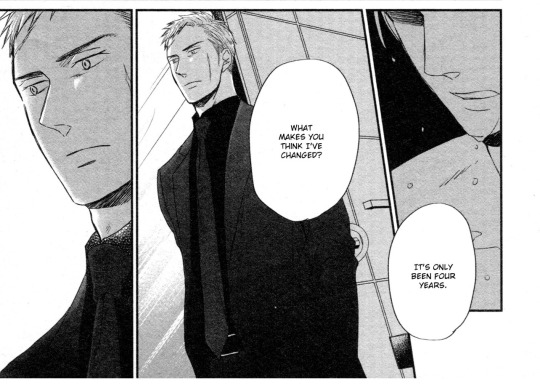
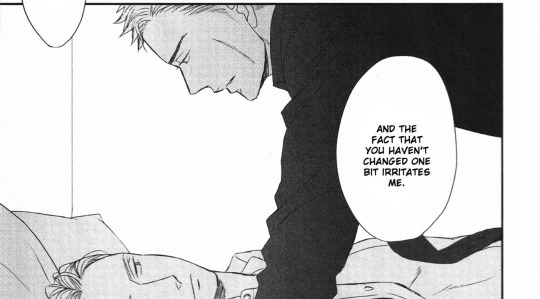
Ch. 43 (top) and ch. 46
Because “Yashiro hasn’t changed,” he still thinks Yashiro doesn’t like serious relationships. He still thinks Yashiro will only have sex with men who are rough and don’t care about him (Inami, Kido) because that’s Yashiro’s coping mechanism. So, to not hurt Yashiro with gentleness, to prevent other men from hurting him, to be as close as possible to him, to keep him from running away, and to appeal to his coping mechanism, he uses cruelty and sex.
It’s very backwards. Hurting to prevent hurt... Similarly, being hurt to prevent hurt…
Doumeki and Yashiro’s fortes. These two are the best worst match, truly.
I didn’t even mention the slut-shaming, but I believe that lies in his jealousy, possessiveness, and hurt from being tossed away mostly.
2.) Why won’t Doumeki abide by Yashiro’s requests to not have sex?
doumeki assumes with confidence what yashiro wants and needs, and then acts on those assumptions.
Agree. It doesn’t matter what Yashiro says he wants Doumeki to do or not to do, Doumeki will act the way he does so he “helps” Yashiro realize what he “actually wants and needs” because he thinks Yashiro isn’t capable of that.
To Doumeki, he thinks Yashiro wants what he says he doesn’t want. I believe this is what he realized on the rooftop with Nana.
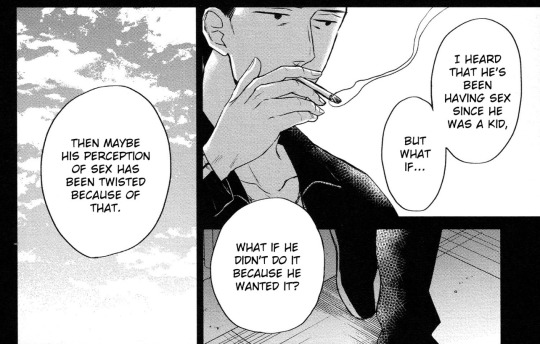
It always puzzled me why Doumeki didn’t take into consideration that time Yashiro told him he got raped by his stepfather in his realization of… something… after Nana told him this. In ch. 4 we are aware that Doumeki knows about how Yashiro’s stepfather raped him (“This man went through the same things as my sister”), so surely he should have considered that part of his past’s effect on his twisted perception of sex??
But now, I think my interpretation—that Doumeki is acting deliberately against what Yashiro says he doesn’t want because, on the rooftop, Doumeki concluded that that’s what Yashiro actually wants—makes sense as to why that scene isn’t considered here, when it really should have been.
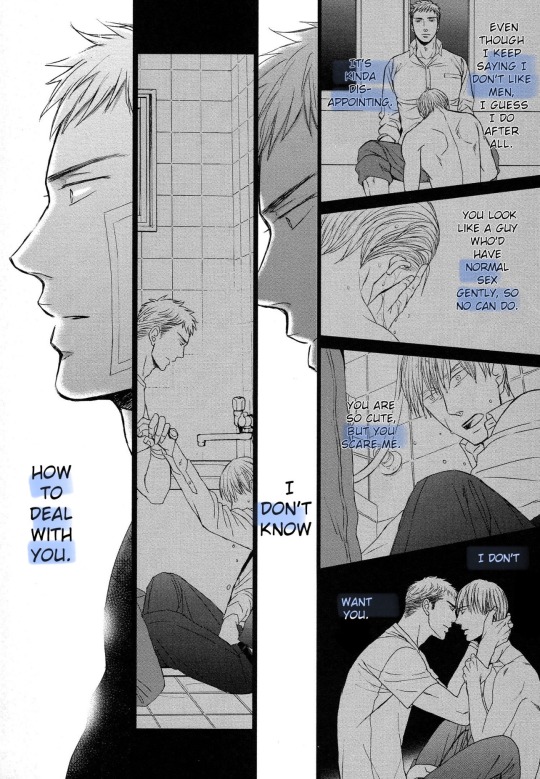
Upon this false realization, he is willing to ignore Yashiro’s protests for the purpose of getting him to realize what it is he desires. He’s forcing him to admit his feelings for him, so that he can accept love. He isn’t wrong that Yashiro is in love with him and has trouble accepting Doumeki’s love and realizing his own feelings of love, but that doesn’t mean he can choose when Yashiro should accept these feelings. That is Yashiro’s choice to make.
My thoughts are the same as yours here:
there's the well-meaning read on this of course, about how doumeki simply wants to protect yashiro from "other men", make sure he doesn't seek them out by satisfying his, as always assumed, needs. and sure, i won't deny that protectiveness is part of it. i don't think it amounts to much, though. this isn't how you help someone you love. nanahara compared yashiro having sex with men to smoking, and he's right. here's the thing: forcibly taking away someone's cigarettes (or "cigarettes", you know), disregarding their personal autonomy, shaming them for their habit and making them feel like shit without addressing the underlying issues doesn't really accomplish much. yashiro starts smoking immediately after doumeki leaves in ch 57, and seeks out inami and kido "despite" his needs supposedly being satisfied for a reason after all
I also read his actions as him partly trying to protect Yashiro from other men by satisfying his sexual desires, but I don’t condone this at all. You can’t sexually abuse someone you love because you think others will. And yes it is very telling how even though Doumeki is there to take away his “cigarettes,” Yashiro still “smokes.” Even though Yashiro’s body seems to enjoy all their sexual encounters, his mind knows there’s something wrong. He knows he doesn’t want sex with Doumeki in these instances, and Doumeki should have respected that.
It’s important to point out how rape victims can still have their bodies “enjoy” the sex, but they really don’t.
We saw this theme at the very start of the story in volume 2… It’s when Yashiro gets raped by his stepfather. His body enjoyed it, but we clearly know it is NOT what he wanted. There was both blood and cum depicted in those panels for a reason… And these contradictory feelings—the crux of Yashiro’s character—cause rape victims to feel worthless and guilty when it was NEVER their fault. This is EXACTLY what Yashiro was feeling at the end of ch. 57. Doumeki needs to realize this…
What makes his actions so messy and you can argue morally gray is that there has been progress, in terms of getting Yashiro to realize things about himself. But I don’t condone his actions and argue Yashiro could definitely have realized these things without the sex. I’m sure that even if Doumeki didn’t make love with Yashiro the first time, Yashiro could still realize and eventually accept that he wanted gentle affection through non-sexual acts. In fact, he was starting to, with liking and eventually loving Doumeki when he was impotent in the first place. Yashiro is perfectly capable of realizing his true wants and needs. To think that he isn’t, is a huge flaw. To think that rape victims can’t figure out what they really want by themselves makes you infantilize them, ignore their voice, and grossly disregard their autonomy. But because Doumeki escalated to sex that first time, and now his discovery of Yashiro’s impotence with others proves to him that he did something that changed Yashiro, he keeps using this same method… believing it will cause him to change again.
This could also explain why he asks about when Yashiro became impotent in ch. 56. He wants to see if Yashiro’s impotence with other men was his doing, so he can prove that he means something to Yashiro and that his current method of using sex has caused Yashiro to change, so that his actions weren’t worthless and he can absolve his own guilt.
most of his actions after the time skip revolve not around trying to understand yashiro, but rather trying to get him to say or admit what doumeki has already assumed
Again, I agree. It’s as you said, Doumeki is self-centered and thinks he knows best, and I’ll address this flaw in my answer to the last and imo most important question.
3.) Why hasn’t Doumeki questioned the morality of his actions?
Surely his actions should remind him of his father in some fucked up way? And surely this would mean that he should realize that and stop treating Yashiro so horribly?
I believe his persistence with the way he currently treats Yashiro stems from, besides the reasons said above, this false belief that he has yet to properly confront: that it wasn’t his fault for Yashiro to consider the time they made love as rape, it was Yashiro’s fault because of his trauma. What he fails to understand is that he actually did rape Yashiro, and it was his fault.
This false belief stems from how he wants to absolve himself of guilt.
he struggles to understand other people's feelings, and sometimes doesn't seem to even consider them in the first place
Yes, it seems this character flaw has been evident ever since we first saw it with Aoi. Because he is self-centered, he can’t understand the feelings of others nor consider them, and he feels guilty when that lack of understanding results in those he loves getting hurt. He then blames himself. It’s an uncomfortably realistic flaw… It’s too hard for him to accept being the one at fault. What’s most important is how he tries to deflect this guilt from himself. With Aoi, he couldn’t understand her crush on him and ignored her, and when he found out what his father was doing, he blamed himself for ignoring her all those years and became impotent. As a result, he vowed to never be like his father to absolve his guilt. This way of absolving his guilt plays directly into how he views and treats Yashiro now.
With Yashiro, he wanted to express his love to him by having sex, but Yashiro never consented to it and was traumatized by both the non consensual aspect and the realization that he never liked cruel treatment to begin with. It broke Yashiro, and Doumeki felt horribly guilty for that. But Doumeki only considers the latter aspect and not the first. The first is too hard to accept for him. It would mean he is like his father, that all his efforts to prevent becoming like his father were for naught, that he is trash who’s barely worth living. But…
…after ch 25, after the damage is already done, but there is still hope for the answer to "am i like my father?" to be "no" (i hope i don't need to say what that question actually stands for, what doumeki actually asks in ch 32, and why it matters that yashiro takes note of it but doesn't answer one way or another).
You refer to this part of ch. 32?
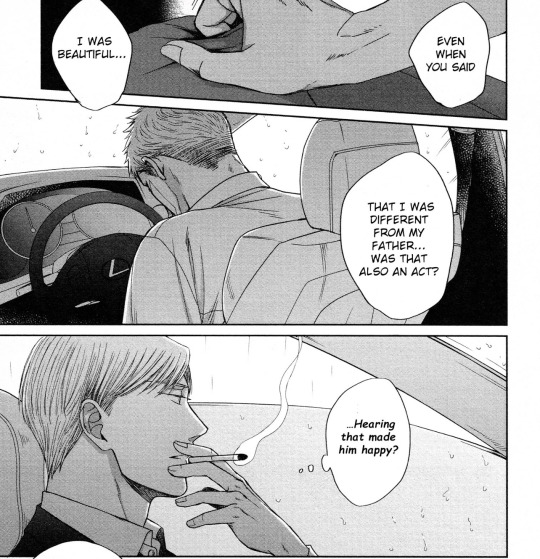
I see what you mean, with not wanting to point out the question. Yes, what Doumeki implicitly asks here is the uncomfortable question, the question both of them already know the answer to. It’s the ugly truth.
“Did I rape you?”
“Yes.”
But Yashiro didn’t answer.
Both of them are willingly denying something here, and these are both of the things I believe they must accept in the end. They must accept these facts in order to truly heal and, if Yashiro wishes, develop a stable romantic relationship between them. Doumeki must come to terms with the fact that he is like his father in that way, and Yashiro must come to terms with the fact that he is a victim.
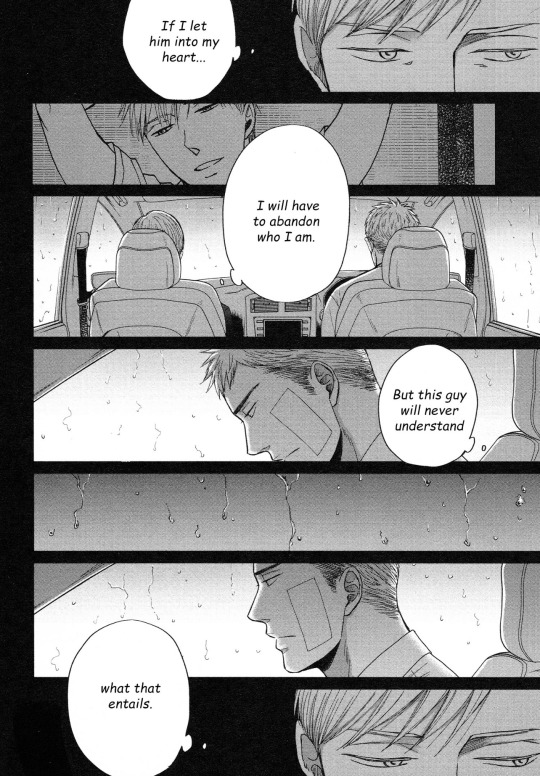
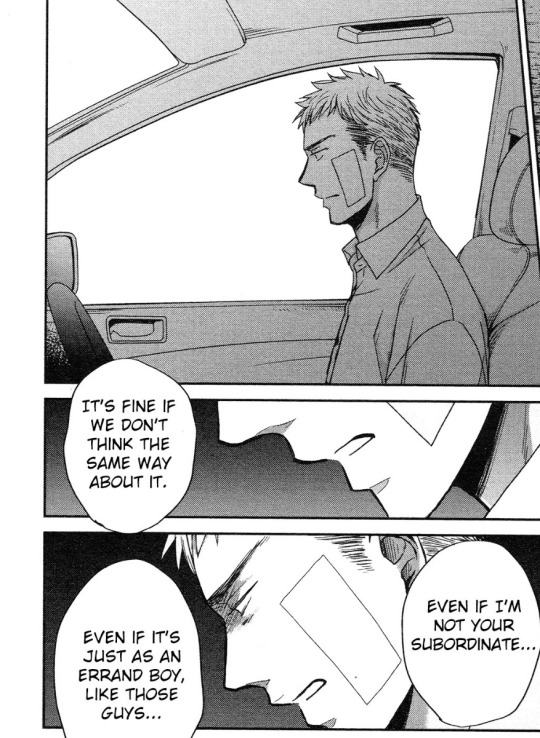
Even after these dark realizations that they can’t yet accept, this scene occurs…
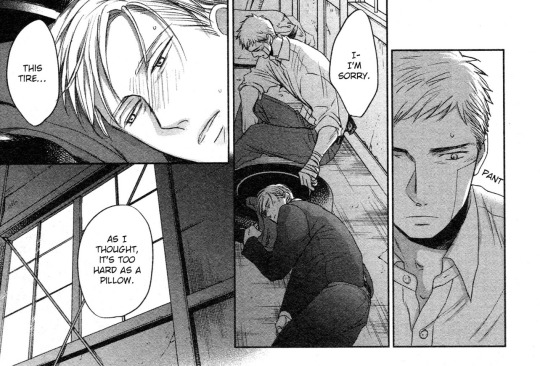
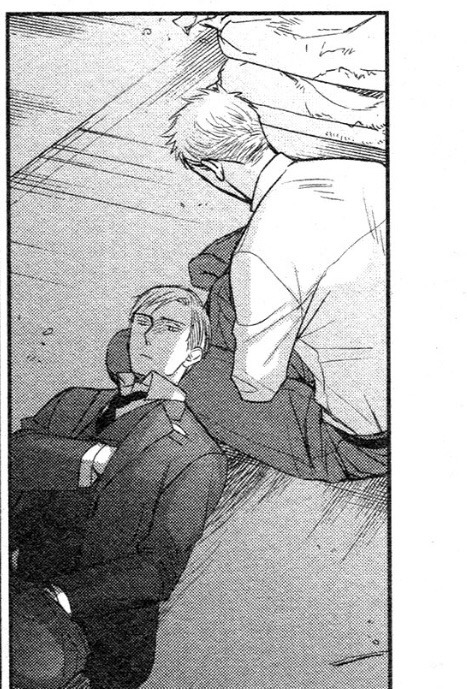
They just can’t help but want the other.
God. They’re so fucked up…
———————————————————————————
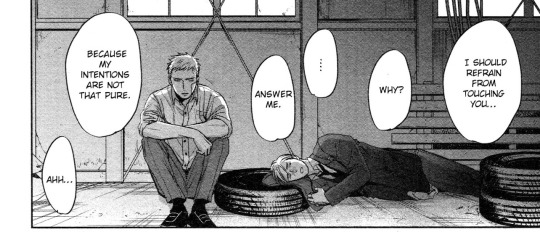
In the end, I reallyyyyyy hope we see this side of Doumeki again. I really want him to wholeheartedly apologize in the end and make up for the wrong things he did. I really want him to forgive himself enough to start properly loving Yashiro. And when Doumeki accepts this, I want Yashiro to slap the shit out of him.
*When I refer to the time they made love, I mean chapter 24/25. I use this term rather than “have sex” because it was emotionally deeper than the more clinical approach Doumeki is taking now. This article explains why I chose the term “make love” and makes the distinction between making love and having sex, while also acknowledging the two terms’ changing connotations. I used the phrase “make love” to simplify the term “emotionally connected sex” and apply the positive connotation, without disregarding the non consensual aspect of the moment.
#saezuru analysis#saezuru tori wa habatakanai#holy fuck this turned out longer than I thought#it’s basically all my thoughts though#it seems rather than make things brief I make them as long as possible#hope these ramblings are interesting in some way#and make sense#how dare Yoneda-sensei write something so thought-provoking#I love it but I hate it#now my heart is in tatters again#doumeki#yashiro#yoneda kou#also is it cause of these toxic traits I point out#that you ship Nanayashi?#if so I have full respect#I like the ship too!#hmm Inami and Doumeki parallels#it’s uncomfortable but worth considering#saezuru discussion#I will never recover from this story
30 notes
·
View notes
Text
After reading AverageAstronaut's fic (aka spaceboyden on Tumblr), the artist-Nicole headcanon has also occupied my brain. Artist Nicole was also a thing I was thinking about after the pilot came out.
The way I imagine it is after the route from the first game where Nicole ditches Crispin to go to the concert with him and decides to try and off herself (but then her mom catches her and sends her to the mental ward).
Jecka and Emily haven't heard from Nicole in a few days. They both get a little concerned and decide to go to Nicole's house to check in on her, but then they hear from her mom that she's been sent to the mental health facility after attempting. The two are worried and guilty for even suggesting to the suicidal girl to try and off herself. However, Jecka feels an extra layer of guilt because she didn't take Nicole's issues, that led up to her resorting to attempting, seriously.
Nicole's mom isn't really giving them details on where Nicole is staying (either out of being overprotective or just not caring that Nicole needs her friends that aren't just people from the mental health ward). But Emily figures out a way to trace where Nicole is at.
When they go to visit her, Nicole is surprised that she even has any visitors since her mom hasn't made too much of an effort to check in on her ever since she was thrown in there. She's more hollow and quiet, but still seems to have that sarcastic quip in her. But if Jecka and Emily keep visiting her, maybe parts of the "old Nicole" won't completely disappear from the meds and therapists who pretend they're trying to help people like her.
Nicole says she's stuck there until she turns 18, and Jecka decides to try and visit her as much as she can. Emily visits too during those two years, but with Jecka's guilt (and saviour complex), she's going to try and be there for her friend.
During one of her visits, she sees Nicole drawing. Nicole just tells her that it's something that the therapists recommended she do to "keep her mind occupied" or something like that. She thinks it's all bullshit, but still kept at it for some reason. Jecka thinks it's actually helping because she sees Nicole's room scattered with a bunch of loose sketches. They're filled with a lot of things. Some mundane. Some disturbing. At some point, Jecka ends up gifting Nicole a sketchbook so that her room wouldn't be such a mess.
Years later, after Nicole gets discharged, she ends up living with Jecka and Emily as roommates. She knows she's not "cured" from all her fucked up issues, but it's better than when she was stuck in all those hostage friendships and hopping from state to state with her mom. Having visitors from the outside on a consistent basis also probably helped her from turning into a complete husk.
While Nicole is out, Jecka gets curious about Nicole's sketchbook (the same one that she gave her while she was in the mental ward). When she opens it, she sees the same pictures she first saw (some mundane, some disturbing). There's a lot of messy lines, sketches, and drawings littered across the pages. But Jecka can also tell that there's progression with her art as time went on. She's actually surprised that Nicole kept at it and didn't just stop.
Some pages are filled with sketches of the room she stayed at at the mental ward. Other pages are filled with her mom physically abusing her. Some pages have her violently attacking various men (assumed to be the many stepfathers she has).
When flipping through the pages, Jecka stops at a section where there's all these drawings of the same person.
Wow, creepy much? At least that's what Jecka would say if this was Jeffery's sketchbook. But when she takes a second longer to look, she realizes that Nicole has been drawing her (Jecka) the whole time she was at the ward.
#class of 09#jeckole#turtle writes#inspired by spaceboyden#is it ooc? probably lmao#but co09 is a rejection sim#and they didnt say that couldnt include rejecting canon lmao
24 notes
·
View notes
Text
The Ambiguous Political Relationship Between Lazare Carnot and Félix Le Peletier


On the surface, and even at a deeper ideological level, a lot divides these two men. Félix Le Peletier became one of the most well-known republican opponents of the Directoire period (among the famous opponents of this period are Bernard Metge, Xavier Audouin, Antonelle, Jean-Baptiste Drouet, Gracchus Babeuf, Victor Bach, although some of them were not aligned on the same ideals—for example, Metge was a liberal follower of the Constitution of Year III and anti-Babouvist), whereas Lazare Carnot was one of the most important members of the Directoire. Carnot was much more conservative on many points compared to Félix Le Peletier. However, their relationship is far more complex than simply being sworn enemies.
Here is an excerpt from their complex relationship: "In early November 1795, upon Carnot's recommendation, Félix Le Peletier was offered a position as a commissioner of the Directoire in the department of Seine-et-Oise. He rejected it with surprising virulence, informing Carnot that he regarded him as a tyrant and would continue to work to overthrow him. Carnot-Feulins, in his Histoire du Directoire, asserts, however, that Félix Le Peletier and his brother had close relations and frequently conversed. In 1796, when the Conjuration des Égaux was suppressed, Carnot led the operation. Yet, Félix Le Peletier escaped the police. Was this with Carnot's complicity? It seems hard to believe, especially since an archival document suggests that he narrowly escaped a police dragnet because he was detained in a café on Rue des Deux-Écus with a soldier. However, when in May 1796, he dared to publish his Second Reflections on the Present Moment, a strong indictment in favor of equality and common happiness, it is certain that he benefited from effective protection. At the same time, an arrest warrant signed by Carnot was issued for Félix Le Peletier, 'accused of conspiracy against the internal and external security of the Republic.' Despite this, Félix Le Peletier acted quite freely in Paris and Versailles. Was Carnot playing a double game? One might assume so. There is testimony to support this. A passage from the Mémoires sur Carnot by his son claims that during the Grenelle uprising, Carnot warned Félix Le Peletier the very morning that the police were about to intervene. Félix Le Peletier supposedly shared this warning with several others. Finally, the close ties between Carnot and Félix Le Peletier are evident during the Hundred Days. Carnot was appointed Minister of the Interior. On his recommendation, Félix Le Peletier was appointed commissioner of the Empire in the department of Seine-Inférieure, where he lived. Elected to the Chamber of Representatives after the May 1815 legislative elections, he went to Paris and was offered the Legion of Honor by Carnot, which he refused."
What is strange is that Félix Le Peletier never forgot that Carnot was responsible for the death of his friend Gracchus Babeuf (whom he was very close to). I believe that while Félix Le Peletier was a staunch activist, he did not believe in the death of a republican martyr and was prepared to continue living and fighting without abandoning his friends. After all, Félix Le Peletier accepted help from his childhood friend Saint-Jean d’Angely when he was persecuted by Bonaparte and nearly deported. So, he might have accepted help from Carnot as well, even though his friend Gracchus Babeuf had been condemned to death, for in any case, Félix could have done nothing.
What I personally find intriguing is Carnot's attitude. I mean, he clearly saw that Félix was not a real threat and decided to protect him. That is to his credit. Yet, he led a repression against the Babouvists, including Félix Le Peletier's friends. I get the impression that Carnot overestimated the "danger" posed by Gracchus and his Babouvist associates compared to other elements under the Directoire regime, and that’s why Carnot acted this way.
Perhaps this is one of the reasons why Gracchus (and Buonarotti) spared Carnot from most of the criticism, while he was virulent against Cochon, the Minister of Police, and Grisel, despite the terrible ordeals Gracchus endured, such as being transported in a metal cage from Paris to Vendôme. The reason may be that Carnot at least protected some of his friends, in addition to other reasons I’ve mentioned here. Indeed, in the last letter Gracchus sent to his friend Félix, he told him that he knew Félix would be spared, even though Gracchus was to be executed, as you can see here.
But the fact that Carnot wanted to recruit Félix Le Peletier offers a plausible explanation for why Émile Babeuf might have worked for Carnot, specifically on a mission during the Hundred Days, as shown here. Indeed, Émile Babeuf, like Félix Le Peletier, aligned with Bonaparte during the Hundred Days. Now, we know that Félix Le Peletier was a protector of the Babeuf family and very close to them (he considered them as a family, and vice versa, not to mention their shared political views on several points). So it’s likely that if Carnot wanted Félix Le Peletier to work for him, Félix could have served as an intermediary for Émile Babeuf to send a letter to Lazare Carnot. This now makes more sense to me, considering what happened between Carnot and Gracchus Babeuf.
Sources (about the excerpt) :
21 notes
·
View notes
Text
It is okay to start over
This post might be too long for a lot of people. That's okay. This post isn't for everyone. This post is for me, and all the other mes out there.
I messed up. I wanted things to be perfect. I could see my life playing out exactly. I would go to school, study environmental science, and I would go on to get a research position in a governmental agency.
If only I knew.
I finished school, against my own will (I ran out of financial aid), and I had to scramble to find a job. I did; as a government official. It wasn't research, but I had hopes of one day becoming part of the research team. I was very proud of myself and my accomplishments.
The only problem was that I hated my job. I tried so, so hard to make things work. I found myself hunched over on the toilet more days than not, panicking, anxious, afraid of my schedule. I cannot, for the sake of my privacy say what it was I did exactly, but I can say that I was bad at it. Despite my best efforts, I was constantly being reprimanded for my anxieties and lack of social graces (I am on the spectrum, as well as suffer CPTSD from my experiences with conversion therapy).
I felt trapped. I live with my partner (the most amazing person to walk this planet), and we make ends meet on our own. It hasn't been easy. My parents don't support my transition, and their parents live 10 hours away.
I was fired this past November. I had to look my team lead in the eyes, knowing I tried so hard and failed. I was angry. I had confided my trust in her, and told her I was transgender, and really, really struggling. It didn't matter. But below those strong emotions, the feeling of relief slowly and quietly washed over me.
While I still had my benefits, I spoke to a therapist about my issues, and she reminded me that I had to be kind to myself. My job left me in a constant fight or flight state, and I had been for the past 9 months. While I wish I had been given more time with this therapist, the time I did have with her led me to look into my complex ptsd more intently. As an aside, I HIGHLY recommend the book Complex PTSD by Pete Walker.
Today, I am three months fired, and I am starting a new part time position as a medical scribe. I am excited, and most importantly, happy. I will be returning to university in the fall, and I will be studying electrical engineering, like I had always dreamed of; before I was told that I could never become an engineer.

Time to let the bad feelings go, toss them into the sea, and welcome the new adventures the waves bring.
17 notes
·
View notes
Text
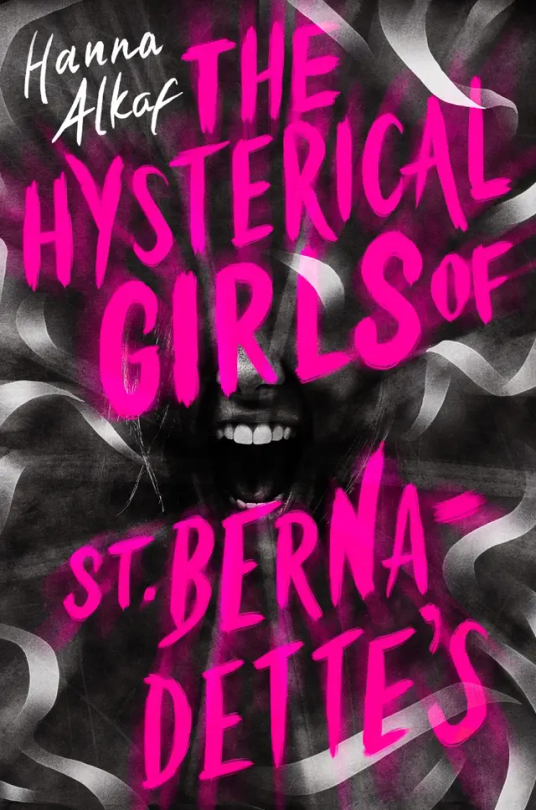


The Hysterical Girls of St. Bernadette's by Hanna Alkaf Salaam Reads/ Simon & Schuster Books for Young Readers
Publisher Summary: An all-girls school is struck with mysterious cases of screaming hysteria in this chilling dark academia thriller haunted by a deeply buried history clawing to the light.
For over a hundred years, girls have fought to attend St. Bernadette’s, with its reputation for shaping only the best and brightest young women.
Unfortunately, there is also the screaming.
When a student begins to scream in the middle of class, a chain reaction starts that impacts the entire school. By the end of the day, seventeen girls are affected—along with St. Bernadette’s stellar reputation.
Khadijah’s got her own scars to tend to, and watching her friends succumb to hysteria only rips apart wounds she’d rather keep closed. But when her sister falls to the screams, Khad knows she’s the only one who can save her. Rachel has always been far too occupied trying to reconcile her overbearing mother’s expectations with her own secret ambitions to pay attention to school antics. But just as Rachel finds her voice, it turns into screams.
Together, the two girls find themselves digging deeper into the school’s dark history, hunting for the truth. Little do they know that a specter lurks in the darkness, watching, waiting, and hungry for its next victim…
Note from author -- "It includes discussions and descriptions of sexual assault, trauma and PTSD. If this is too much for you right now, please set this book down and come back to it when you can. There is no shame in protecting your scars."
My Thoughts: Even before beginning, my worries went down a bit after reading the note from the author. I am not a person who reads horror as a general rule, but for some reason knowing what was coming, helped prepare me and also let me know that the author had thought ahead to care for the readers. This made me more willing to dive in even though scary books are not what I usually grab first.
There are definitely creepy and rather horrifying moments within the pages of this book, but it was also incredibly intriguing. It has Salem witch trial vibes with what seems like random hysteria and it's not something easily explained. When there is so much that is unknowable, there is a lot of room for imaginations to run rampant.
The author shares the story through two perspectives and that choice helps readers see everything unfolding from very different contexts. And there are many layers to what is happening so it is good to have more than one way to pick up the clues that are scattered here and there.
Like the characters, readers are likely to wonder if this is all created or manifested due to humans and their own issues or whether there may be some monsters lurking about. The answer is a complex one that I will obviously not reveal, but the many moments of wondering kept me flipping the pages rapidly.
Beyond the actual screaming, there are questions or ponderings about how girls are perceived, how they are meant to act, who listens to them and when and how they use their voices. There's a lot going on beyond the ghost/monster portion of the story though there is plenty of that for those readers who love that aspect.
My Recommendation: Get it as soon as possible. Do not skip it unless it would be too much right now. This would be a great Halloween read, but could work anytime really. It's a unique story that raises many questions and for me the ending was particularly satisfying. This was one of my favorite books of the year.
Pages: 352 Review copy: ARC via publisher & library copy Availability: On shelves now
Extra: Brief talk on mass hysteria - Hanna Alkaf on TikTok
24 notes
·
View notes
Note
hey
ik you're busy with processing all this scrapped ending stuff, but imma ask anyways. so people here and on twitter tend to say that killua and gon's relationship is codependent. how is it shown? cuz to me they're just extremely devoted to eachother, but i can't exactly see this whole codependency thing.
love your analysis btw, you're great❤️
Hi! Thank you very much for the kind words, I appreciate it! (Obviously answering this after a while, as the scrapped ending topic isn't quite as omnipresent now.)
On one hand, I do think their relationship has aspects of codependency, for reasons I'll go into below. But there's a lot going on in their relationship, and I also believe people use this term as sort of a catch-all for the various issues.
So, what is codependency?
Codependency is a dysfunctional relationship dynamic where one person assumes the role of 'the giver,' sacrificing their own needs and well-being for the sake of the other, 'the taker.' -- Psychology Today
I mean...doesn't this sound like Killua's unhealthy, self-sacrificing devotion for Gon?
Killua mostly takes on this role himself, but Gon does stoke this dynamic, assigning Killua the role of holding him back in dangerous situations and expecting him to clean up after his messes.

Killua is happy to have this role supporting Gon and takes it seriously, but as the series goes on, the burdens he deals with on Gon's behalf keep getting more and more extreme, and when Gon pushes him away even when he's doing his role (trying to keep Gon from doing something reckless and getting carried away, in the scene where Gon confronts Pitou), it breaks Killua's heart.
The issues between these two have a root cause: Both of them love each other more than they love themselves. This is the key to understanding many of the underlying issues in their relationship.
In Killua, this manifests by devotedly taking on whatever Gon wants or needs no matter what personal cost it has to him, trying desperately to be of service to him because it's the only way he knows how to express his love for him. Coming from the Zoldyck family, it makes sense acts of service are one of the only ways he believes love can be expressed meaningfully. As I said in another post, he even takes on things Gon doesn't ask him to do, and then hides how much he does for Gon and the costs it has to him, so Gon isn't even aware of how much Killua suffers on his behalf.
In Gon, this manifests by prioritizing Killua's life while recklessly disregarding his own. Remember this line?

I come back to this scene all the time because it's vital to understanding the way Gon values Killua above himself. To Gon, his life isn't worth all that much, but Killua's life is another story.
When Killua could have died if he dodged differently in the Dodgeball match, Gon loses his temper completely, to the point where he can't even answer Bisky's simple questions. I recommend reading the whole scene to see just how pissed Gon is about this, but for the sake of brevity here's the most important part:
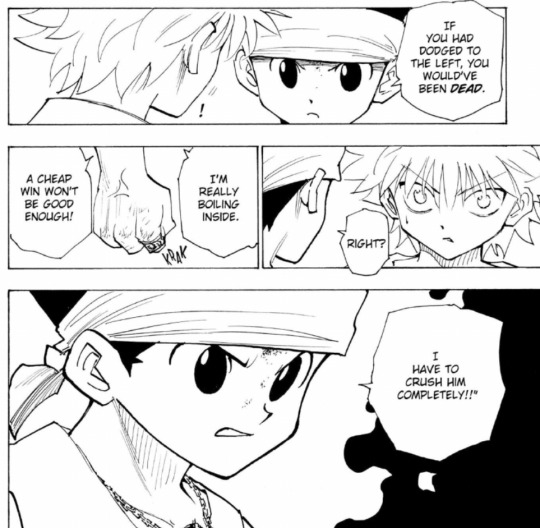
This happens before the pivotal scene of Killua holding the ball for Gon, severely injuring his hands. There's a lot of complexity to this scene and what it means in their relationship, it honestly deserves its own post because it's difficult to summarize, but it shows us Killua being perfectly willing and happy to be gravely injured on Gon's behalf, and Gon accepting Killua's willingness to sacrifice and suffer for him. Definitely a case of codependency, if you revisit the definition above.
At the same time it's an indication of deep trust and understanding between the two: Gon knows that Killua wants to do this for him and he allows him to do this because he knows it has meaning to Killua. Killua knows that he's the only one Gon would ever entrust such a task to, and that means the world to him, even before Gon says his "It has to be Killua," line. And ultimately, even if it's a bit twisted, this act is all in service of Gon trying to avenge Killua being put at deadly risk.
When Gon is in front of Pitou and says the "This means nothing to you," line, this is intended to push Killua away, tell him it's not his fight. This battle is Gon's burden, he's willing to give up his life if it comes down to it, but Gon doesn't include Killua in his plans because, after all, Gon believes that it's okay if he dies, but not Killua. While the way Gon lashes out at Killua says more about his emotional state at the time than his intentions, his repeated pushing Killua away during his grief and rage is one of the ways he ironically shows love towards Killua--he doesn't want Killua to have to share this burden or die on his behalf, because he sees it as all his fault. Even when Killua contributed to what happened in a way (knocking Gon out in order to take him and leaving Kite behind, something Killua definitely blames himself for), Gon refuses to blame him even slightly.
But because Killua stakes his entire self-worth on how useful he can be to Gon (codependency), being pushed away by Gon and not allowed to share his burdens and his pain is just about the deepest wound Gon can inflict on Killua. It's not what Gon intends with his actions--if anything it's him trying to protect Killua in his own way--it's just the way their respective issues with self-esteem manifest, and it's unfortunate. It's why they need to split up for now, to heal and work through what happened, so they can come back together, communicate properly, and build a better dynamic the second time around.
Now, when discussing their codependency I think it's worth remembering some things: They are both young teens with issues with trauma and self-esteem, who haven't had close friendships prior to this. Many of the less healthy aspects of their friendship, like their lack of fully communicating for instance, are tendencies from the ways they were raised. They adore each other more than anything, they almost never intend to cause harm to each other, and the "roles" they take on in the relationship that end up hurting them are generally more self-imposed and coming out of their individual issues than something either of them is forcing the other to take on.
Their relationship has been transformative and deeply meaningful to both of them, and they're definitely happier together than apart. The issues between them need to be addressed and reflected on by both of them, but I truly believe this is something they'll be able to overcome ultimately.
#hxh#hunter x hunter#gon#killua#killugon#gonkillu#meta#my posts#asks#anonymous#long post#I feel like there's things I could dig into more but this is already long!
95 notes
·
View notes
Note
I feel like you've probably read a lot of medieval history stuff. So have you, and if you have how do you think it impacts your work on vesna? p.s. I'm reading a Medieval Life by Judith Bennett and its an awesome read so far can't recommend it enough
Hello! Thank you for the ask!
I read a lot and have for a while. Vesna is the composite of a LOT of interests of mine, many of them specifically historic and regional. I've always been interested in the medieval period, and I loved Pillars of the Earth when I read it as a teen (still like it, the second book especially, though I take issue with some of Follett's character work). Name of the Rose too, naturally. Recently I've enjoyed Between Two Fires by Christopher Buehlman, and the game Pentiment. I like the ASOIAF books, which are obviously less interested in intricate medievalism than tone and complex political and personal interplay, but imo aren't any worse for it.
In terms of non-fiction, currently reading "Felix Austria" by Stephan Vajda on that front. I love The Once and Future Sex by Dr. Eleanor Janega too. A lot of my process for Vesna involves researching specific points, though- I was trying to find out how exactly rushes worked, and stumbled on a 19th c. text which documents rush-bearing in certain parts of england and goes into the history, for example. I try to read as much of this stuff as I can. The region Vesna is set in doesn't get much materialist history done to it. It's very hard to find out what sort of agriculture was practiced in the hills at the time, for example. Even Felix Austria, a pretty hefty book, mostly brushes over it and says "life was on the whole easier and fruits and crops more abundant than in other parts of europe at the time," which is a bit meagre.
Visually, it's influenced by whatever visual art I consumed recently. I read Dungeon Meshi and fell in love with Ryoko Kui's solid figure drawing and character designs. I read Berserk and fell in love with Miura's landscapes and shading. I played Dark Souls and fell in love with the intricate architecture and tranquil emptiness. I visit ruins and castles here in Austria whenever I can, ideally one a week, and forests and rivers even more. I already mentioned Pentiment, but I have a huge reference folder of 13th century art on my pc. My biggest artistic influence is probably Socar Myles, who does better hatching work and dark fantasy illustration than anyone I've ever seen.
For the character work I would have to point to my best friend Digital Poppy's work. I liked her games before I knew her, and actually getting to talk to her about them (and helping make them!) opened my eyes to what you can have characters do in a story.
I hope this answered your question! Sorry i don't have a specific text to point to!

bonus: Vesna appearing in one of Digital Poppy's games
48 notes
·
View notes